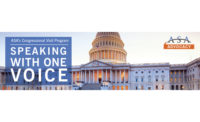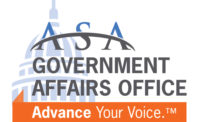The House and Senate are in recess this week.
Congress
The return: After Congress returns from its July 4th recess next week, legislation will start to move on several fronts. First, committees will be drafting bills pertaining to the bipartisan infrastructure package, that the White House signaled its support for last week. The Problem Solvers Caucus, a bipartisan House coalition consisting of 29 Democrats and 29 Republicans, also endorsed the plan. The Senate is planning to have a vote on the infrastructure package sometime in July. Second, legislation containing several Democratic priorities (think President Biden’s ‘Social Infrastructure’ plan) will begin to make its way forward. At the same time, the budget reconciliation process will also proceed, with the final number on a reconciliation package remaining to be determined. It could be as low as $2 trillion, with Senate Budget Chairman Bernie Sanders (I-VT) advocating something as high as $6 trillion. Chairman Sanders released an overview two weeks ago that included $1.6 trillion in spending over the President’s request.
INVEST in America Act: Last week, the House passed the INVEST in America Act. In addition to priorities such as Buy American provisions, addressing climate change goals and increased funding for rail and public transportation — the bill includes $105 billion in funding over ten years for drinking water systems. This legislation also provides $45 billion for replacement of lead pipe in water systems nationally.
Politics
Senate battleground: As focus begins to shift to the 2022 midterms, there are currently eight (four Democratic, 4 Republican) Senate seats that political handicappers are looking at. The Democratic-held seats include Sens. Catherine Cortez Masto (NV), Maggie Hassan (NH), Mark Kelly (AZ) and Raphael Warnock (GA). The Republican-held seats are comprised of two open contests, Sens. Richard Burr (NC) and Pat Toomey (PA), along with Sens. Ron Johnson (WI) and Marco Rubio (FL).
Republicans: While Republicans will be playing more defense this cycle, having to defend 20 of 34 seats that are up for election nationally, 16 of those seats are solidly Republican and (of this writing) are unlikely to be lost. In contrast, Democrats must defend 14 seats, with 10 of those considered to be solidly Democratic.
Democrats: The Kelly (AZ) and Warnock (GA) seats were won from Republican incumbents in 2020 and should be among the most closely watched and expensive races in 2022. With Republicans having the wind at their backs for a midterm cycle, they may be able to pick up one or both seats, as they try to win back the majority. Sen. Masto (NV) will likely be up against former Attorney General Adam Laxalt. His grandfather, Paul Laxalt, served as both U.S. Senator and Governor of Nevada. Sen. Maggie Hassan will potentially receive a challenge from current New Hampshire Governor Chris Sununu. Gov. Sununu holds the distinction of being a popular GOP governor in a New England state. His father, John Sununu, also served as Governor of New Hampshire and White House Chief of Staff under President George H.W. Bush, and his brother (also John) served as a Senator from New Hampshire (2003-2009).
North Carolina: The North Carolina seat, currently held by retiring Sen. Richard Burr, will likely be easier to hold given Sen. Thom Tillis’ performance in a difficult 2020 cycle, when he was re-elected 49-47. However, Sen. Burr’s announcement that he would not seek re-election set off speculation that former President Trump’s daughter-in-law, Lara, would seek the seat. A few weeks ago, Ms. Trump announced she would not seek the seat, leading to the former President’s endorsement of Rep. Ted Budd. This surprised many, as former Governor Pat McCrory and former Rep. Mark Walker have also announced their campaigns for Senate.
Special elections: The next elections for vacant House seats are – Previously Democratic-held: Ohio’s 11th (Primary 8/3, General, 11/2) and Florida’s 20th (1/11/22). Previously Republican-held: Texas’ 6th District (Special Election Runoff – 7/27) and Ohio’s 15th (Primary 8/3, and General, 11/2). The House now has composition of 220 Democrats to 211 Republicans.
For State legislation tracking, visit ASA's web-based state legislative tracker here.
State legislative action
AB 100 Update: This week, the California Senate Environmental Quality Committee is scheduled to hear AB 100, a bill that regulates the manufacture and sale of endpoint fixtures that conform to the NSF 61 2020 standard. ASA, along with its coalition partners, has obtained a compromise on the bill. This compromise, which has received the initial approval of the bill author (Assemblymember Chris Holden) and the California Senate Environmental Quality (EQ) Committee, will go a long way to accommodate our members in the transition to providing endpoint fixtures with significantly reduced lead content.
As written, the compromise amendments specify:
- Require, on January 1, 2022, all NSF 61 2020 compliant products will be labeled according to the standard itself, with the mark ‘NSF/ANSI/CAN 61: Q<1.’ (Labeling Requirement)
- Require, on January 1, 2023, all endpoint products manufactured on or after this date, be certified to the NSF 61 2020 standard. (Manufacture Date)
- Require, on July 1, 2023, that all endpoint products available for sale be certified to the NSF 61 2020 standard. (Sell-by Date)
This is a very positive development that removes California-specific labeling, provides another year for manufacturers to get compliant products into the supply chain and gives our wholesalers/distributors an additional six months to sell product that does not comply with NSF 61 2020, to clear their inventories.



